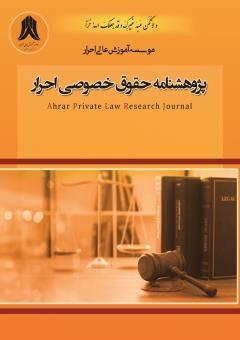مسوولیت مالکان کشتی در قبال نشت LNG درحقوق ایران
محورهای موضوعی : Maritime law
1 - کارشناسی ارشد حقوق خصوصی، گروه حقوق، دانشکده ادبیات و علوم انسانی، دانشگاه گیلان، رشت، ایران.
کلید واژه: مسئولیت مدنی, نشت LNG, مالکان کشتی, جبران خسارت زیست محیطی, حقوق دریایی ایران ,
چکیده مقاله :
گاز طبیعی مایعشدهLNG بهعنوان یکی از منابع نوین و راهبردی انرژی در صنعت حملونقل دریایی، علیرغم مزایای اقتصادی و زیستمحیطی، در صورت نشت، میتواند پیامدهای جبرانناپذیری بر اکوسیستمهای دریایی و ایمنی ناوبری برجای گذارد.. در حقوق ایران، نشت LNG از کشتیها یکی از مسائل نوپدید و چالشبرانگیز در حوزه مسئولیت مدنی به شمار میرود که بهسبب خلأهای تقنینی، پرسشهای حقوقی متعددی را مطرح ساخته است. مقاله حاضر با هدف تبیین مبانی و حدود مسئولیت مالکان کشتی در قبال نشت LNG، به بررسی مواردی میپردازد که میتوانند موجب تخفیف یا رفع مسئولیت آنان شوند؛ از جمله بروز نقص فنی غیرقابل پیشبینی با وجود رعایت الزامات فنی و بازرسیهای منظم. همچنین، نقش نهادهای دولتی در الزام مالکان به جبران خسارات زیستمحیطی حتی در غیاب تقصیر مستقیم، مورد تحلیل قرار گرفته است. این پژوهش با روش توصیفیتحلیلی و بر پایه تحلیل قوانین موضوعه، مبانی فقهی و نظریات حقوقی صورت پذیرفته و در پایان، راهکارهایی برای تقویت نظام مسئولیت مدنی در حوزه حملونقل دریایی ایران پیشنهاد میگردد.
Liquefied Natural Gas (LNG¹), as an emerging and strategic energy source in the maritime transport industry, despite its economic and environmental advantages, can cause irreversible damage to marine ecosystems and navigation safety in the event of leakage. In Iranian law, LNG leakage from ships is regarded as a novel and complex issue in the realm of civil liability, which, due to legislative gaps, has raised numerous legal questions. This article aims to clarify the foundations and scope of shipowners’ liability in the event of LNG leakage and explores the conditions under which such liability may be mitigated or excluded—such as unforeseen technical defects despite adherence to inspection and maintenance protocols. Furthermore, the role of governmental authorities in compelling shipowners to bear the costs of environmental cleanup, even in the absence of direct fault, is critically analyzed. This study employs a descriptive-analytical method, drawing on statutory law, Islamic jurisprudential principles, and legal doctrines, and concludes by proposing practical solutions for enhancing the civil liability framework within Iran’s maritime transport sector.
